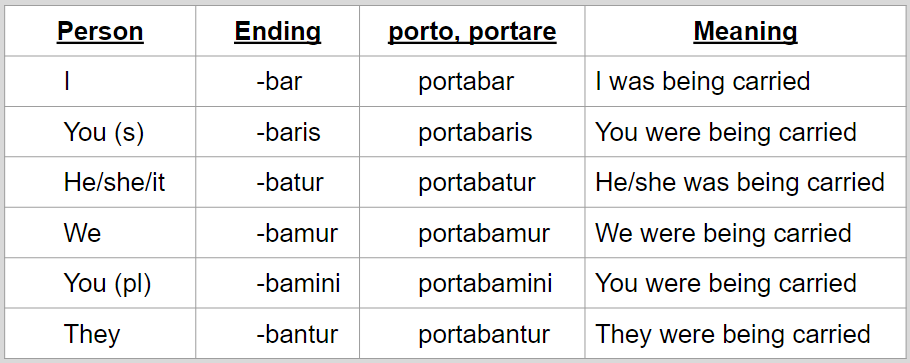Imperfect Passives: The Return of Impy the Sheep
January Latin Challenge: Day 27 of 31
Welcome back to Day 27 of the January Latin Challenge on bambasbat! If you have missed any days, you can always jump to the bambasbat archive, where you can find all my previous posts.
What are Imperfect Passives?
Imperfect passive verbs are verbs that are in the imperfect tense and the passive voice.
To help you out with your verb endings, I want to give you my Complete Reference Guide to Latin Verbs. It’s got all the endings you need in there, for all tenses, voices, and moods.
Active or Passive?
An active verb is a verb where the nominative is doing the verb.
The boy was kicking the horse.
A passive verb is where the nominative is having the verb done to it. So the person is still grammatically the nominative, but they're no longer doing the verb.
The boy was kicked by the horse.
The boy is still the nominative, but his role in the sentence has changed. He is now being kicked.
Easy to Spot in Latin
Imperfect Passives are very easy to spot in Latin for the following reasons:
They're formed from the present stem.
They use the same passive endings as the present passive verbs
And they follow the pattern of the imperfect tense in the active: the "-ba-" from the imperfect active.
Remember the -ba- from Day 12 of the January Latin Challenge? It is a really easy signifier to spot if you remember Impy the Imperfect Sheep! He is Imperfect, because he says -ba- not “Baa”, and he WAS eating grass.
Enough nonsense, more Latin!
For example, here is the Imperfect Passive table of porto:
Note: Again, like in the present passive, you do not need “being” in the translation, I just find it helps people to remember that it's a passive.You can just say, I was carried. You were carried.
As you can see, we've still got the imperfect meaning, the “was” that we expect from an imperfect, because we always have that imperfect signifier: -ba-
Example Sentences
Have a look at these examples. Use the endings table above to help you figure out who is doing each verb. All the vocabulary you need is below in the green box, so you just have to focus on the grammar. Have a go at these now, and read on when you are ready for the explanations.
nos nautae ab imperatoris laudabamur.
ducem necare iubebar.
dominus ab uxore veneno occidebatur!
num vos a duce puniebamini?
ab omnibus monebaris.
Read on when ready!
nos nautae ab imperatoris laudabamur.
First thing you always do is you look at the verb. So laudabamur is at the end, “we were being praised”. Remember, you don't need the “being” if you don't want it.
nos at the beginning goes with that verb, so that's helpful.
Then I get some more information about us. We are nautae: “sailors”.
Finally I get a little bit more information, ab imperatoris, “by the general”.
“We sailors are being praised by the general.”
ducem necare iubebar.
Always look at the verb first. iubebar has my -bar ending, so use the endings table. It means “I was being ordered”.
Then I've got an infinitive as well. necare, “to kill”
And finally the ducem the leader.
“I was being ordered to kill the leader.” or I could just say “I was ordered to kill the leader.”
dominus ab uxore veneno occidibatur!
Looking at my verb first, occidebatur is the he/she/it ending. So “he or she was being murdered”.
Next I find my nominative, I go to dominus, which is “the master”. So “the master” is the grammatical nominative that was being murdered.
Then I get my ablative of agent ab uxore. Now uxor means wife, ab uxore “by the wife”.
Then I get another ablative. This one is an ablative of instrument, veneno that tells me how he was killed - “with poison”.
“The master was being murdered by his wife with poison.”
num vos a duce puniebamini?
num means surely not. You're expecting the answer “no!”
Find the verb next: puniebamini. This is my you plural ending. So “you were being punished”.
Remember num and then add that in. num vos puniebamini: “surely you were not being punished”. a duce is another ablative of agent.
“Surely you were not being punished by the leader?”
ab omnibus monebaris.
monebaris is the verb. So I'm going to go to that first. -baris is the you singular ending, and then I'm going to look in the vocabulary and find that moneo means “warn”. So “you were being warned”.
Then the ablative of agent: ab omnibus - “by everyone”.
“You were being warned by everyone.”
And that's imperfect passives!
They're really simple to spot because they've still got that -ba- syllable, and then they just follow the present passive endings.
If you're not sure about any of the endings, do go and grab my Complete Reference Guide to Latin Verbs. It will really help you and it's completely free.
Thank you so much for reading this. If you have any questions or comments, leave them for me below, and I'll see you tomorrow on bambasbat for Day 28 of the January Latin Challenge!



